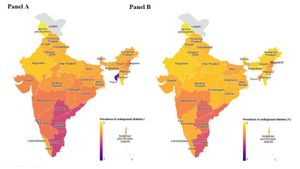The Brazilian government is taking significant steps to update its key social welfare programs for 2025, particularly the Bolsa Família and the Bolsa do Povo. These recent adjustments aim to bolster assistance to vulnerable populations as the nation grapples with economic challenges and social inequality.
One of the most notable updates is to the Bolsa do Povo program, initiated by the São Paulo government. This program will see increased financial offerings, with assistance potentially reaching up to R$ 2,490, benefiting workers who have previously been employed but now find themselves seeking financial support. The Bolsa do Povo is expected to serve as one of the main pillars of social assistance, promoting not only immediate financial relief but also professional training and job reintegration for countless individuals. "Aumentando os valores e ampliando a elegibilidade para trabalhadores que já tiveram carteira assinada," stated officials from the São Paulo government, highlighting the program's flexible support structure aimed at various demographics.
For 2025, Bolsa do Povo will offer several categories of assistance, including the Bolsa Trabalho, which provides R$ 540 monthly for unemployed individuals engaged in public-interest activities. Meanwhile, the Bolsa Talento Esportivo caters to both base and professional athletes, with values ranging from R$ 415 to R$ 2,490. Other assistance programs include Ação Jovem for youth aged 15-24, and housing aid for families displaced by natural disasters. This initiative serves as both immediate relief and as part of long-term poverty alleviation efforts by investing in skilled labor for the future.
Shifting gears to the Bolsa Família, the program continues to be the cornerstone of Brazil's income transfer policies. The Caixa Econômica Federal, the agency responsible for disbursing these funds, has announced updates for 2025 aimed at maintaining the program's effectiveness and reach. "O Bolsa Família continua sendo o principal programa de transferência de renda do Brasil," said representatives from Caixa, underlining the initiative's significance. Over 21 million families benefit from this support, which serves as both social security and as a catalyst for economic improvement.
Changes to Bolsa Família include increased benefit amounts, as well as tighter eligibility criteria tied to the Cadastro Único, or Unified Registry for Social Programs, which tracks poor families for government assistance. This year, the Brazilian government has emphasized the necessity of regular updates to the CadÚnico to prevent fraud and misallocation of resources. An executive measure ensures all household data remains current, impacting how families receive their benefits. This adjustment aligns with the government’s broader aim of ensuring the program reaches those most in need.
The Bolsa Família continues to support basic needs but now places enhanced conditionalities on beneficiaries, such as mandates for school attendance and healthcare check-ups. The program's goal is not solely financial assistance, but also long-term improvements to education and public health among low-income groups. Recent data has shown vast improvements, with studies indicating direct links between the program's implementation and reductions in poverty levels. "Desde sua criação, o Bolsa Família tem sido fundamental para a redução da pobreza e desigualdade social no Brasil," noted analysts focused on social policy.
From the economic standpoint, the updated Bolsa Família is expected to stimulate increased consumption as beneficiaries use their funds to procure basic necessities like food and clothing, circulating cash within their communities and aiding local businesses. The socioeconomic impact is multifaceted; as staples are purchased, job creation often follows, supporting both formal and informal sectors of Brazil's economy.
Finally, both social welfare programs are part of Brazil's broader commitment to inclusivity and poverty reduction for all. The government is aware of the challenges presented by the current economic climate, yet remains steadfast about ensuring comprehensive support to those affected. Enhanced collaboration with various sectors—including partnerships with educational institutions and the private sector—will remain integral to the effectiveness of these programs. Achieving the dual goals of financial support and sustainable development may well define the administration's social policies for the coming years.
With these decisive updates for 2025, the Bolsa Família and Bolsa do Povo programs are set to play pivotal roles in shaping Brazil's approach to welfare and community support, ensuring more families can achieve stability and gain access to opportunities previously out of reach.



